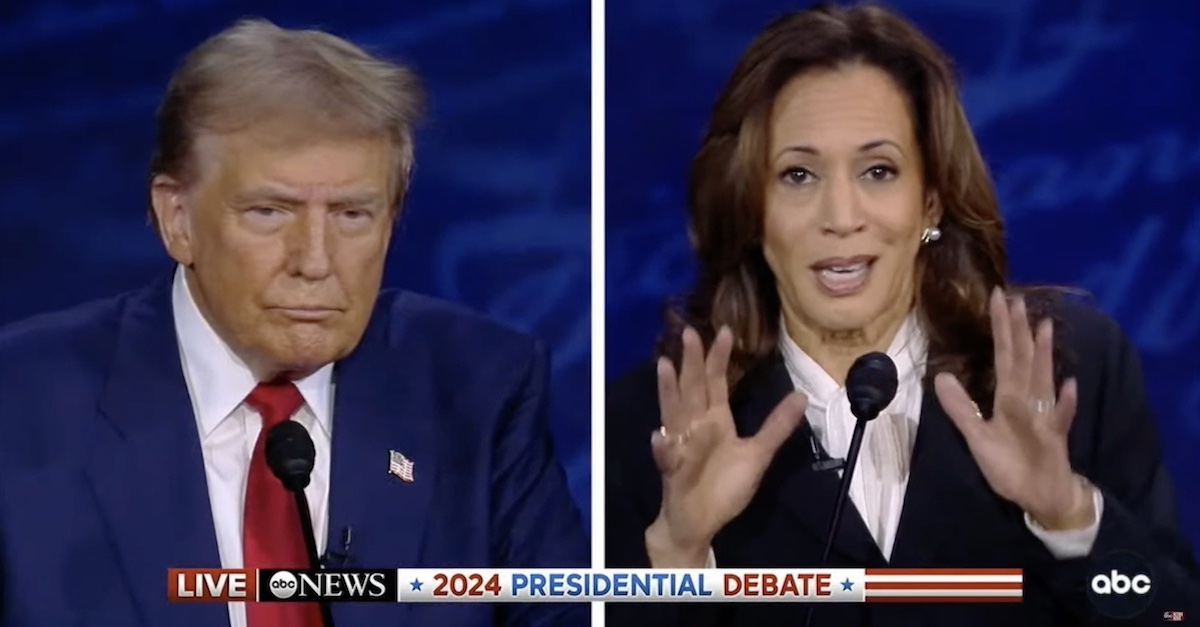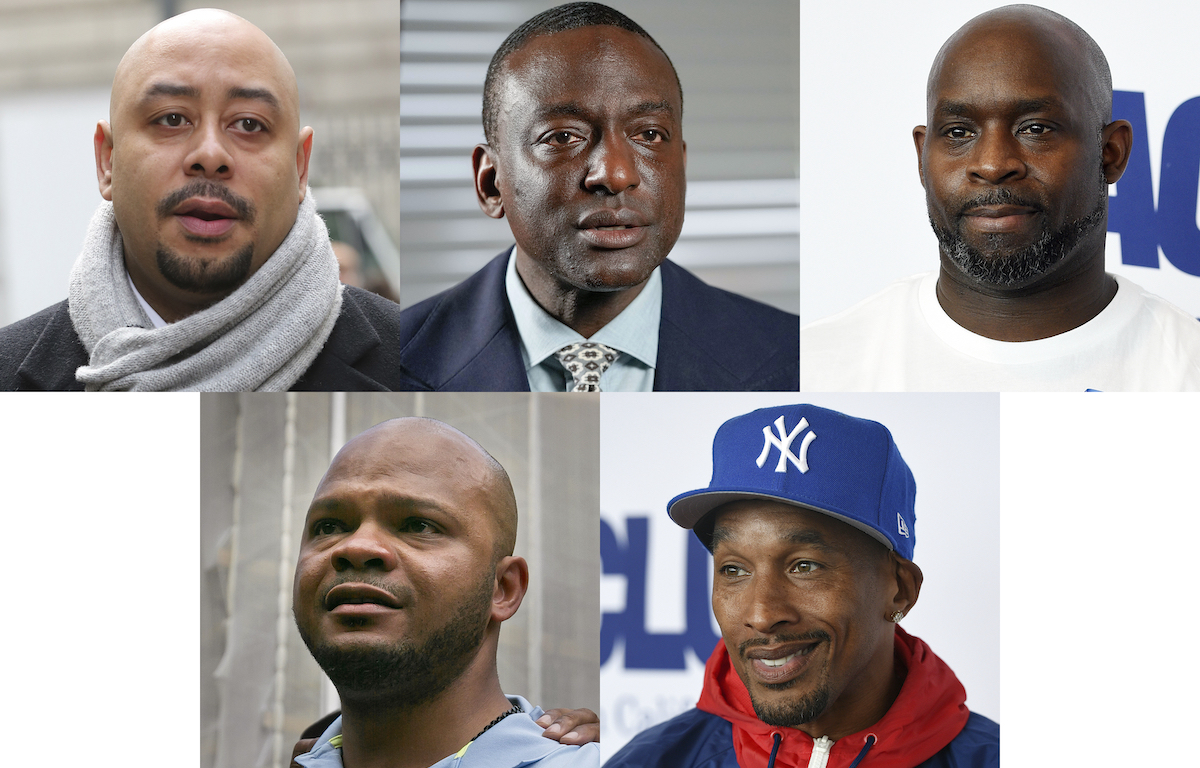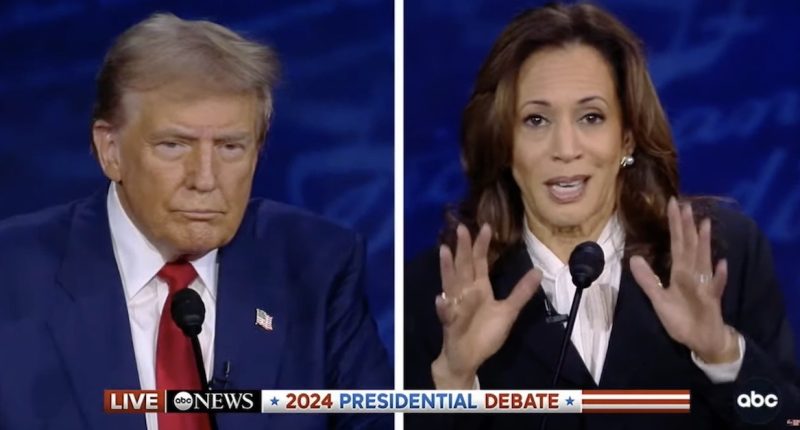
Presidential candidates Donald Trump and Kamala Harris pictured during portion of Sept. 10, 2024 debate on ABC that gave rise to Central Park Five defamation lawsuit (ABC News).
A Pennsylvania federal judge on Friday slammed the brakes on the Central Park Five”s defamation lawsuit against President Donald Trump until his claim of immunity is decided in the appellate court, a clear win in the meantime for Trump as far as delay is concerned.
The order from recently minted Chief U.S. District Judge Wendy Beetlestone, a Barack Obama appointee, was just one line in length, but a multi-page footnote spelled out her reasoning.
As Law&Crime has reported, Trump’s private attorneys had argued that, although Beetlestone declined to throw out the case, the president is being “chilled by meritless litigation” and was entitled to a stay of the lawsuit pending his immunity-centered appeal in the 3rd U.S. Circuit Court of Appeals.
Beetlestone previously ruled that the Commonwealth’s Uniform Public Expression Protection Act (UPEPA) — an anti-Strategic Lawsuit Against Public Participation (anti-SLAPP) statute — didn’t apply in federal court.
But Trump’s appeal maintained that the anti-SLAPP statute — which, like others, exists to prevent defendants from being intimidated or silenced by the threat of expensive and frivolous lawsuits — contains an “immunity from suit” provision he’s entitled to claim.
Emphasizing that his “appeal presents a non-frivolous question,” Trump urged Beetlestone to order up an “immediate stay” pending an active appeal at the 3rd Circuit. And that’s what the judge has done, explaining why, again, in a lengthy footnote.
“[W]hen a court determines that a party is not entitled to one of these immunities as a matter of law, and the party claiming the immunity appeals, it is entitled to a stay pending the outcome of the appeal, provided that the claim of immunity is not frivolous,” the judge wrote. “Defendant argues that, because this immunity is akin to absolute and qualified immunity—i.e., that it is an ‘immunity from suit,’—he is entitled to a stay while he litigates his entitlement to that immunity on appeal.”
Beetlestone determined that because “the text of the Anti-SLAPP statute itself suggests that the ‘essence’ of its immunity is indeed ‘a right not to stand trial'” and not merely an “immunity from liability,” Trump won the day.
“These provisions collectively work to insulate immunity-claimants from the burdens of trial until such time as their entitlement to the immunity is conclusively decided,” the judge wrote, granting the stay pending appeal.
Antron Brown, Kevin Richardson, Raymond Santana, Korey Wise and Yusef Salaam filed their defamation suit in October, saying that Trump — during a 2024 debate with then-Vice President Kamala Harris — had “falsely stated that Plaintiffs killed an individual and pled guilty to the crime.”
In 1989, the then-teenagers were wrongfully accused of raping Trisha Meili as she jogged in Central Park in New York City. The five were also accused of attacking two men that same night.
“While in police custody, Plaintiffs were each separately subjected to hours of coercive interrogation, under duress, with no attorney present and often without a parent or guardian present,” the lawsuit recounted. “Plaintiffs all initially denied having any knowledge of the Central Park assaults. However, after hours of interrogation, four of the Plaintiffs agreed to provide written and videotaped statements in which they falsely admitted to having been present during the assaults.”
Love true crime? Sign up for our newsletter, The Law&Crime Docket, to get the latest real-life crime stories delivered right to your inbox
The Central Park Five faced trials, maintained their innocence, were convicted by juries in 1990 and were sent to prison, only to be exonerated decades later after the real attacker, Matias Reyes, admitted to the crime against Meili and DNA “conclusively” proved that Reyes was the “true perpetrator,” court documents said.
Notably, the five did not plead guilty and were not accused of killing anyone — yet, during a nationally televised presidential debate with Harris in Pennsylvania last September, Trump said: “They admitted – they said, they pled guilty. And I said, well, if they pled guilty they badly hurt a person, killed a person ultimately.”
The remarks were a response to Harris’ statement that, throughout his life and career, Trump has “attempted to use race to divide the American people,” and that an example of this was the “full-page ad” he placed in the New York Times and elsewhere in 1989 “calling for the execution of five young Black and Latino boys who were innocent — the Central Park Five — took out a full-page ad calling for their execution.”

FILE – This combination of file photo shows, clockwise from top left, Raymond Santana, Yusef Salaam, Antron McCray, Korey Wise and Kevin Richardson, known as Central Park five. (AP Photo/File)
In the ad at issue, Trump advocated for bringing back the death penalty and alluded to the Central Park Five case:
Many New York families — White, Black, Hispanic and Asian — have had to give up the pleasure of a leisurely stroll in the Park at dusk, the Saturday visit to the playground with their families, the bike ride at dawn, or just sitting on their stoops — given them up as hostages to a world ruled by the law of the streets as roving bands of wild criminals roam our neighborhoods, dispensing their own vicious brand of twisted hatred on whomever they encounter. At what point did we cross the line from the fine and noble pursuit of genuine civil liberties to the reckless and dangerously permissive atmosphere which allows criminals of every age to beat and rape a helpless woman then laugh at her family’s anguish?
The ensuing lawsuit alleged that Trump engaged in “malicious, intentional and reckless conduct” and should be on the hook for punitive damages to “punish Defendant Trump for his conduct and deter him and others similarly situated from like acts in the future.”
In June, Beetlestone ruled that Pennsylvania’s anti-SLAPP statute “does not apply here, in federal court,” and that the defamation case could move forward as a result, but Trump’s lawyers with the Dhillon Law Group have since succeeded in arguing that their “not frivolous” immunity claim made a stay necessary and proper while the appeal is pending.
“Without a stay, the damage will already be done as President Trump would have been subjected to the hardships involved in litigation for a matter for which he was immune from suit,” Trump’s motion said previously. “In this scenario, President Trump would have wholly lost the principal benefit of the immunity UPEPA was enacted to confer, and to which he was legally entitled. This constitutes irreparable harm.”
Jerry Lambe contributed to this report.








